Every week, the editors of The Paris Review lift the paywall on a selection of interviews, stories, poems, and more from the magazine’s archive. You can have these unlocked pieces delivered straight to your inbox every Sunday by signing up for the Redux newsletter.
This week, we bring you Benjamin Nugent’s story “God,” Rowan Ricardo Phillips’s poem “Kingdom Come,” and Kristin Dombek’s “Letter from Williamsburg.”
If you like what you read, you can also listen to all three in the ninth episode of our podcast, “God, Etc.” And if you like what you hear, why not give us a boost in the charts by subscribing on iTunes. While you’re there, tell us in the comments how much you love the show.
“God,” by Benjamin Nugent
Issue no. 206 (Fall 2013)
We called her God because she wrote a poem about how Caleb Newton ejaculated prematurely the night she slept with him, and because she shared the poem with her friends.
Caleb was the president of our fraternity. When he worked our booth in the dining hall he fund-raised a hundred dollars in an hour. He had the plaintive eyes and button nose of a child in a life-insurance commercial, the carriage of an armored soldier. He was not the most massive brother, but he was the most a man, the one who neither played video games nor rejoiced at videos in which people were injured. His inclination to help other brothers write papers and refine workouts bespoke a capacity for fatherhood. I had seen his genitals, in the locker room after lacrosse, and they reminded me of a Volvo sedan in that they were unspectacular but shaped so as to imply solidity and soundness. One morning when we were all writhing on the couches, hungover, he emerged from the bathroom in a towel, attended by a cloud of steam. We agreed that the sight of his body alleviated our symptoms.
“Kingdom Come,” by Rowan Ricardo Phillips
Issue no. 209 (Summer 2014)
Not knowing the difference between Heaven
And Paradise, he called them both Heaven.
So when he shrugged at the thought of a god
Blanched in the lights of implausible heights,
Thumbing the armrests of a throne, that was
Heaven. And when he stared out at the sea,
Feeling familiar to himself at last,
He called that Heaven, too …
“Letter from Williamsburg,” by Kristin Dombek
Issue no. 205 (Summer 2013)
There are many kinds of prayer. There is a kind of prayer that’s like breathing. There is a kind of prayer that’s like talking to your best friend all day long. There is a kind of prayer in the face of beauty that lifts your hands up because it would be harder to keep them down. There is a kind of prayer for meaning that is answered by the one who wrote the book of the whole world and your life, so that the prayer is like waking up and finding yourself a character in the most elaborate of novels, as you’ve always suspected: authored, written into a world of meaning, a world meaningful because it was created by someone. There is a kind of prayer that is only a listening, the soft voice of God saying your name, saying “come to me, come to me.” There is the prayer of failure, and the answering voice that forgives you. There is the death prayer, your whole body crying “why” and the voice again, telling you that you will see your loved one again in heaven.
If you like what you read, why not become a subscriber? You’ll get instant access to our entire sixty-four-year archive, not to mention four issues of new interviews, poetry, and fiction.
from The Paris Review http://ift.tt/2BGYGsU

Comments
Post a Comment